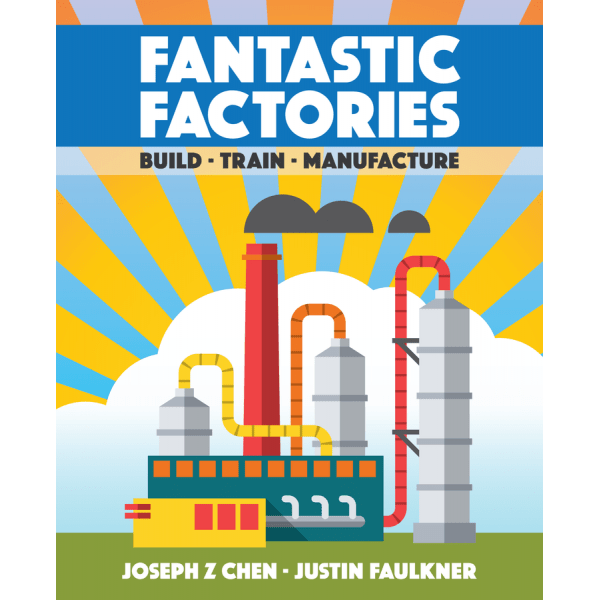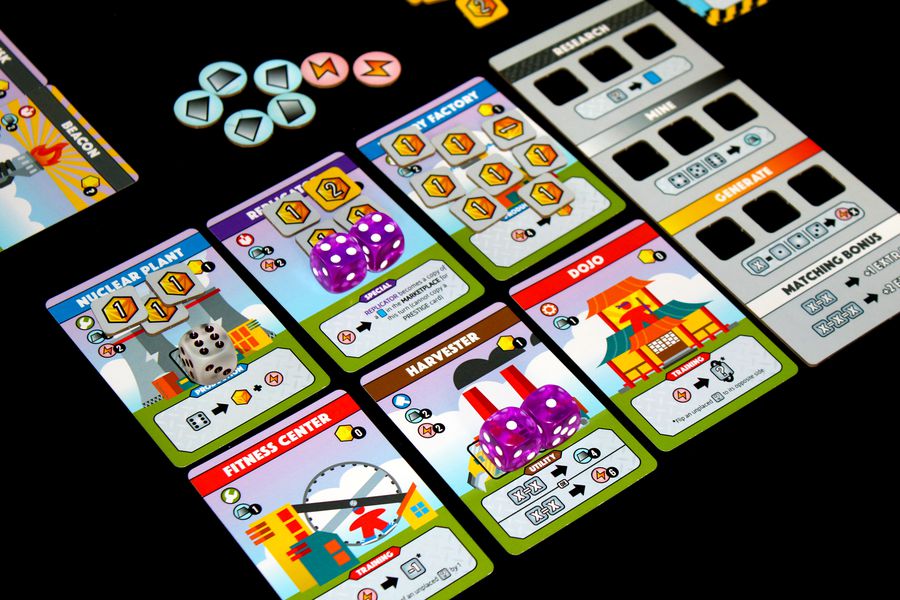Victory Points: Joseph Chen and the Dawn of Fantastic Factories

“My prototype showed the most promise, so I continued to pursue it week after week with the core group of friends helping playtest and pitch ideas.”
It began as most origin stories do: a person bonding over board games. “A roommate of mine had a copy of Settlers of Catan and we probably played a couple nights a week for a while,” begins Joseph Chen. “Eventually I moved out into a place of my own...and there was a period of time where I didn't play many board games until I started designing one.”
That period is where the rubber meets the road. It’s the part of the story where Chen’s interests began to converge. “My close friend is a creator, inventor, and collaborator at heart. The year before, he rallied four of us together to build LED soccer jerseys so we could play soccer in the dark,” explains Chen. “The following year we were deciding whether to do a coding project or design a board game and ended up pursuing the latter.”
Chen (along with co-designer Justin Faulkner) recently entered an ever-crowding market with his first design, Fantastic Factories, which was born from this desire to create.
“I do have a more analytical and logical approach to design”
By day, Chen is a software engineer. His analytical mind began to shape the game that would become Fantastic Factories, but as with any game, it took time to reach its final form.
“Fantastic Factories was very much designed with mechanics first. With the engine-building aspects, factories felt like a natural fit. However, a factory isn't exactly the most exciting theme,” describes Chen. “Eventually, the game became Fantastic Factories because it was alliterative, more exciting, and also uniquely searchable because there was no other game or entity with the same name.”
But it was not as cut and dry as slapping a theme onto a mechanic and pumping out a game. As Chen explains, Fantastic Factories underwent some changes during the process. “One of my friends really loved space as a theme and for a very short while the game was actually called Rocket to Mars. However, it quickly became apparent that it would be difficult to give the game a space theme.”
Beyond shedding its earlier space theme, Chen was adamant in leveraging his “logical approach” by exhaustive playtesting. Outside of his creative group, he leaned on his software engineering skills to help with the process of development. “I wrote a very basic Ruby script to calculate dice odds for me by simply simulating rolls thousands of times rather than figuring out the combinatorial math. Using those odds, I was able to balance the power level of various cards.”

Fantastic Factories (photo by Erik Yurko, licensed under CC BY-NC-SA 3.0)
“As a new designer I hadn't realized how much baggage that came with.”
Scripting out a game as involved as Fantastic Factories uncovered new issues and new problems to solve for Chen, chief among them the simultaneous nature of turns during the game. “When taking turns at the same time, players can't really interact in any meaningful ways without introducing some kind of race condition,” explains Chen. “Introducing elements of interactivity had to happen within the market phase, which really limited the available design space for solving the interactivity problem.”
Every designer -- whether a rookie or a seasoned vet -- encounters these issues during the design process. For Chen, it was changing Fantastic Factories into something else. “For a while, we went down a detour where our main source of interaction was through direct take-that mechanics. While it increased the amount of interaction between players, we found the mechanics to be very divisive.”
Chen, like many others before him, found that compromises were in order. “In the end, we removed those mechanics, found some other ways to introduce light amounts of incidental interaction, and decided to just own the multiplayer solitaire aspect of the game [of focusing] on maximizing the core engine-building fun of the game.”
“There are so many steps to bringing a game to life.”
After finishing the game, it was time for Chen and Faulkner to bring the game to the masses via Kickstarter, which itself presented many challenges to overcome, including a very ironic realization. “Justin and I had no experience in manufacturing or fulfillment logistics. It was very intimidating for sure,” starts Chen. “In fact, for a while we were in talks with a publisher to potentially have them pick up the design. But...I realized how attached I was to this project and that no matter what publisher we signed with, there would inevitably be some decisions that the publisher would make that we would regret. That's when we decided to prepare ourselves for the Kickstarter route.”
Beyond relying on literature from James Mathe and Jamey Stegmaier to understand the work involved with launching a successful Kickstarter campaign, Chen and Faulkner also found help in their local community. “Through PlaytestNW I was able to meet many people who have gone down the same path. Eventually, someone introduced me to Facebook groups where I found a large and very active set of groups focused on all aspects of the industry from design to Kickstarter to publishing.”
Yet Chen realized that with a full-time job and a family, his and Faulkner’s pursuit of launching Fantastic Factories and their Metafactory Games imprint would require a “significant amount of work on the back end regarding retail sales and distribution.” As Chen notes, “Those relationships take a lot of time and industry know-how to develop and would take away focus from what we are good at and enjoy doing.”
Knowing how to design an engaging game and launch it via a successful crowdfunding campaign, Chen and Faulkner wanted to continue to focus on the aspects of design and publishing they loved. With this in mind, they began entertaining offers for a partnership before finding the right balance with Deep Water Games. “Our companies' skill sets and interests complemented each other well, and we were aligned on how we wanted to operate.”
As with any good origin story, the end is just the beginning. Despite a busy home and work life, Chen and Faulkner are already at work on the first expansion for Fantastic Factories with, Chen teases, “asymmetric player powers.”
But fans of the game will likely have to be patient, as Chen explains. “For now and the foreseeable future, Metafactory Games will be a side venture for both Justin and me. That means we'll be taking it one title at a time, and that current title is the expansion for Fantastic Factories. There are a lot of really great opportunities out there and unfortunately not enough time to pursue them all!”




